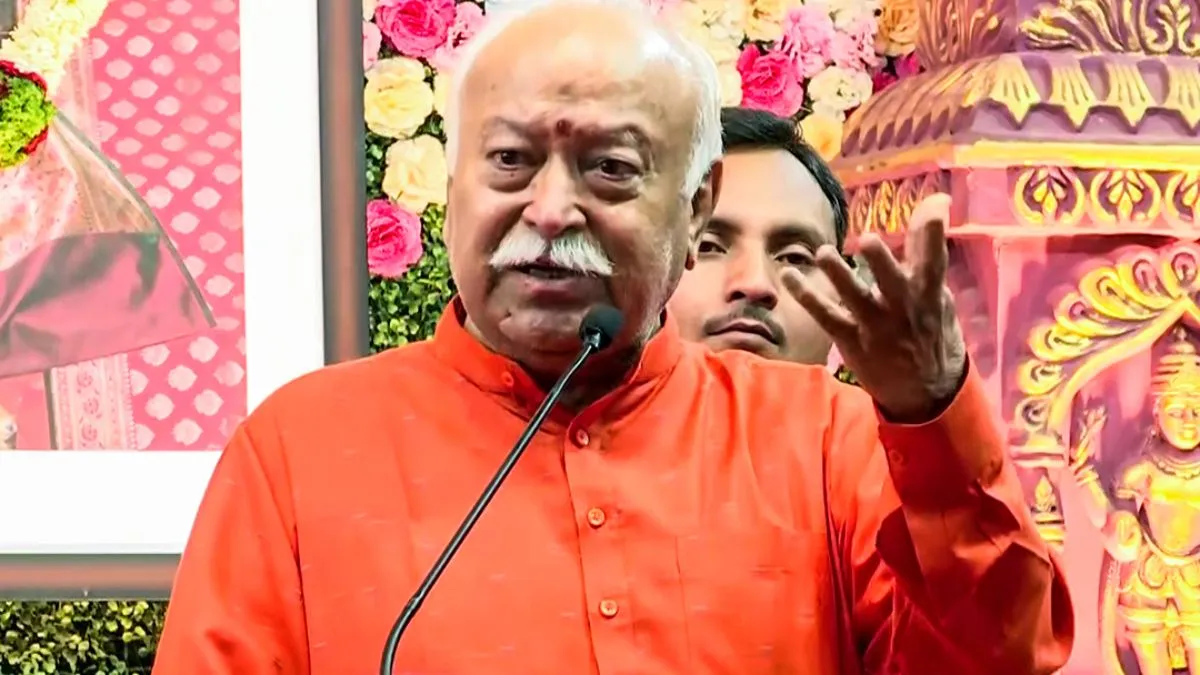- By Priyanka Koul
- Fri, 20 Dec 2024 11:06 AM (IST)
- Source:JND
At the inauguration of the Hindu Sewa Mahotsav in Pune, RSS Chief Mohan Bhagwat expressed concerns over the persistent temple-mosque disputes in India. He suggested that some individuals, following the construction of the Ram Mandir in Ayodhya, believe they can become "leaders of Hindus" by stirring up such issues. During a lecture titled "India – The Vishwaguru" at the Sahjeevan Vyakhyanmala series in Pune on Thursday, Bhagwat emphasised the importance of an inclusive society and underscored India’s responsibility to present a model of peaceful coexistence to the world.
The Hindu Sewa Mahotsav, organised by the Hindu Aadhyatmik Sewa Sanstha, is being held at the Shikshan Prasarak Mandali’s college ground in Pune and will continue until December 22.
Speaking about India’s rich diversity and unity, Bhagwat highlighted that Christmas is celebrated at the Ramakrishna Mission, a testament to the inclusiveness inherent in Indian society. He remarked, “We are Hindus, and such unity is possible because of our traditions.” Stressing India’s historical harmony, Bhagwat noted that this spirit of coexistence must thrive to serve as an example for the rest of the world.
He strongly criticised those who, in the aftermath of the Ram Mandir’s construction, attempt to provoke religious tensions by raising new disputes. Calling such actions “unacceptable,” he cautioned against deliberately stirring controversies.
Although Bhagwat did not mention any specific temple-mosque dispute, he indicated that these matters are often rekindled unnecessarily. “Every day, a new matter is being raised. How can this be allowed? This cannot continue,” he stated, emphasising the need for societal harmony. He also referred to the increasing number of court petitions seeking surveys of mosques to uncover underlying temples but refrained from naming specific cases.
Bhagwat further criticised external groups driven by rigid ideologies who seek to restore old forms of dominance. He contrasted such attitudes with India’s democratic setup, governed by the Constitution. “Now, the country runs as per the Constitution. In this setup, people choose their representatives, who run the government. The days of hegemony are gone,” he said.
Drawing historical parallels, Bhagwat contrasted the policies of Mughal emperor Aurangzeb, known for his rigidity, with those of his descendant Bahadur Shah Zafar, who banned cow slaughter during the 1857 uprising. He also mentioned the British role in deepening communal divides, leading to the creation of Pakistan. “It was decided that the Ram Mandir in Ayodhya should be given to Hindus, but the British sensed this and created a rift between the two communities. Since then, this sense of ‘algavwad’ (separatism) came into being,” he explained.
Bhagwat questioned the use of the "language of dominance" in a nation where everyone identifies as Indian. He reiterated that India’s traditions allow individuals to follow their respective faiths as long as they coexist harmoniously and abide by the country’s laws. “Who is a minority, and who is a majority? Everyone is equal here,” Bhagwat declared, reinforcing his call for unity and harmony.
'Sewa As A Core Principle Of Sanatan Dharma'
Bhagwat stressed that Hinduness represents an eternal dharma, and the Acharyas of Sanatan Dharma adhere to the principles of Sewa Dharma—the dharma of humanity. He emphasised that Sewa (service) is central to this eternal dharma, deeply rooted in both Hinduness and humanity.
During his address, Bhagwat described Sewa as the essence of Sanatan Dharma, transcending religious and social boundaries. He urged individuals to engage in service not for recognition or personal gain but as an act of pure and selfless giving back to society. He also advised that acts of service should be carried out humbly, without any desire for publicity, and should adapt to the needs of the time and place.
About The Hindu Sewa Mahotsav
The Hindu Sewa Mahotsav serves as a platform to showcase social service initiatives by temples, religious organisations, and monasteries from across Maharashtra. It also provides insights into Hindu culture and rituals. The festival not only celebrates Hindu traditions but also underscores the pivotal role of Sewa in fostering a compassionate and cohesive social fabric.

